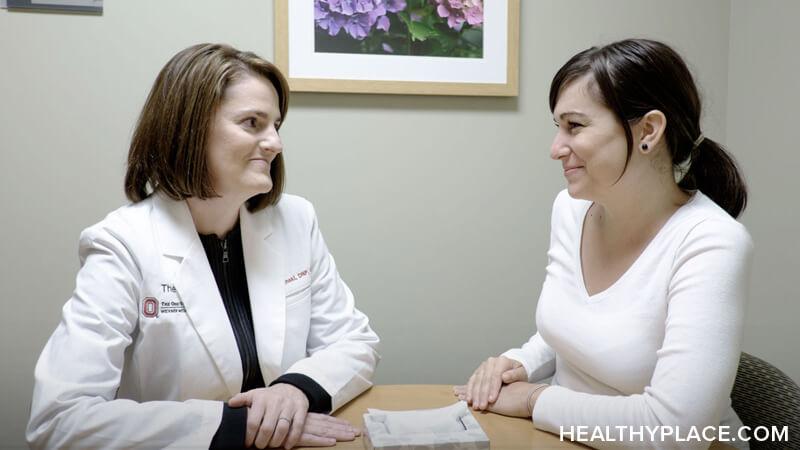Is It Anxiety or a Medical Condition?
 Is it anxiety or a medical condition? It can be hard to tell because anxiety can feel miserable throughout the entire body, and symptoms can be frightening enough to cause people to wonder if they have anxiety or a medical condition. Not knowing what your symptoms mean can increase existing anxiety or cause new anxieties and worries. Of course, that can worsen physical symptoms and that, in turn, increase worries. Worrying whether you have anxiety or a medical condition can become a vicious cycle of worry, physical discomfort or pain, and worsening mental-- and physical health. Knowing what medical conditions share symptoms with anxiety can help you sort out the healing approach that is best for you.
Is it anxiety or a medical condition? It can be hard to tell because anxiety can feel miserable throughout the entire body, and symptoms can be frightening enough to cause people to wonder if they have anxiety or a medical condition. Not knowing what your symptoms mean can increase existing anxiety or cause new anxieties and worries. Of course, that can worsen physical symptoms and that, in turn, increase worries. Worrying whether you have anxiety or a medical condition can become a vicious cycle of worry, physical discomfort or pain, and worsening mental-- and physical health. Knowing what medical conditions share symptoms with anxiety can help you sort out the healing approach that is best for you.
Physical Symptoms: Anxiety or Medical Condition?
Before exploring this, it’s important to acknowledge that truly, anxiety often is a medical condition in its own right. Mental health and physical health are intertwined, and mind and body are intimately connected. Anxiety (like other mental disorders) is largely brain-based with other factors involved, too. It is:
- Neurological
- Neurochemical
- Heritable
- Cognitive (thought-based)
- Emotional
- Behavioral
- Psychosocial
- Environmental
The brain is a physical part of the body; it just also happens to do “non-physical” things like thinking and emoting. Sometimes we segregate mental health and physical health too much. But sometimes doing so is a good thing, as it helps us understand what we’re experiencing and where we need help. To compare anxiety and physical health conditions, we’ll look at them separately.
Anxiety is a complex experience with multiple causes and effects. We can experience anxiety without having a diagnosable anxiety disorder, or we can have one or more anxiety disorders. Anxiety has many symptoms, including physical symptoms. Among the symptoms we feel in our body:
- Shortness of breath
- Pounding/racing heart
- Chest pain
- Muscle tension
- Dizziness
- Feeling faint
- Nausea
- Tremors
- Sweating
- Feeling nervous, keyed up, like we might jump out of our own skin
These are indeed physical symptoms of anxiety. However, these symptoms are also part of other health conditions.
Medical Conditions that Share Symptoms with Anxiety
Many illnesses have symptoms that overlap with the symptoms of anxiety. While this list is by no means exhaustive, it highlights some of the common conditions that can be confused with anxiety:
- Heart disease
- Cardiac arrhythmia
- Tachycardia
- Angina
- Heart attack
- Hyperthyroidism
- Lupus
- Anemia
- Asthma
- Emphysema
- Premenstrual syndrome
- Menopause
- Head injury
The overlapping symptoms of these illnesses with the physical symptoms of anxiety can make it difficult to determine what’s going on. Further, anxiety can occur alongside any of these conditions, making it hard to pinpoint what, exactly, is causing the unpleasant symptoms.
What to Do About Confusing Anxiety vs. Medical Condition Symptoms
It’s important to listen to your body. Tune in to your symptoms, and record what they are, when they occur, and how painful/intense they are. Having a written record will make communicating with healthcare professionals easier.
Seeing your primary care doctor is a logical place to start when you are having any type of physical symptoms. Let him or her know what you’re feeling, what your life circumstances are (including stress level), and any other relevant information. Your doctor may be able to determine what you’re experiencing without tests, or he or she might order tests. This will provide you with peace of mind or a diagnosis and treatment plan.
It also makes sense to see a therapist or other mental health professional. Your doctor can often make a recommendation. A therapist or counselor can help you address and reduce your anxiety.
When you have a goal to enhance your physical health and your mental health (which, again, aren’t entirely separate) and you go after that goal by seeing a doctor and a mental health professional, you will very likely find that your physical symptoms of anxiety and any medical conditions decrease. Even better, your mental health and wellbeing will increase.
APA Reference
Peterson, T.
(2018, January 18). Is It Anxiety or a Medical Condition?, HealthyPlace. Retrieved
on 2026, February 27 from https://www.healthyplace.com/blogs/anxiety-schmanxiety/2018/01/is-it-anxiety-or-a-medical-condition
Author: Tanya J. Peterson, MS, NCC, DAIS
There is no depression on the list of bordering with anxiety disorders? Shouldn't it be ?
Hi Oksana,
Yes, depression does indeed share symptoms with anxiety. (Also, it can be argued that both are medical and physical health conditions because they involve the brain.) In addition to depression, other conditions classified as mental illness can have symptoms that overlap with anxiety and co-occur with anxiety. Because of word-count restrictions, the scope of this article is limited to discussing illnesses traditionally defined as physical/medical rather than including illnesses traditionally labeled as mental disorders. This article is designed to help people sort out anxiety versus what is considered a medical illness. You are correct, though, that depression fits into the bigger, and very realistic, picture.